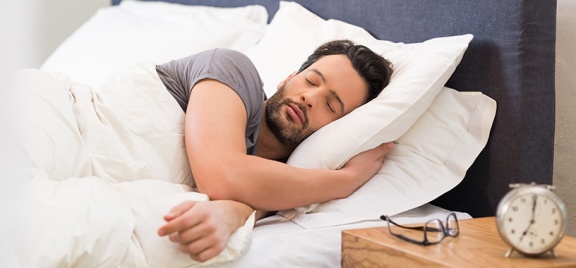
By: Ashmar Mandou
Sleep is an important part of a healthy lifestyle. The average adult needs 7-8 hours of sleep a night. Not getting enough sleep can cause forgetfulness, irritability, and put you at increased risk for health problems like depression and heart disease. Since March is Sleep Awareness Month, we tackle healthy sleeping habits with Dr. Margaret Park, Sleep Neurologist at Advocate Illinois Masonic Medical Center in this month’s Medical Corner.
Dr. Margaret Park
Sleep Neurologist at Advocate Illinois Masonic Medical Center
 Nearly 60 million Americans suffer from chronic sleeplessness. Can you share with our readers what the negative effects are for sleep deprivation?
Nearly 60 million Americans suffer from chronic sleeplessness. Can you share with our readers what the negative effects are for sleep deprivation?
Sleep deprivation has been linked to several medical issues – heart attacks, stroke, dementia, anxiety, depression, diabetes, weight gain, infertility – and the list keeps growing. Sleep issues are also significant from a personal and public heath safety perspective, including risk of car accidents and public transportation accidents.
What are some of the causes for a poor night’s sleep?
Sleep disorders interfere with the ability to fall asleep and stay asleep, cause poor sleep quality, and exacerbate daytime fatigue. Behaviorally, many do not devote enough hours to sleep or adopt habits that disrupt sleep. Examples include evening caffeine, nicotine, or alcohol intake, use of electronics prior to or even during sleep hours, and variable bedtimes and wake times.
How does stress play an integral role in lack of sleep?
Stress impacts the ability to wind down in order to prepare for sleep. We need to adequately decompress – without electronics – in order to avoid over-stimulating the brain and properly go to sleep.
What are a few tips someone can follow to prepare for a restful night?
A healthy routine prior to bedtime is key! Take some time to relax, unwind (without alcohol or caffeine), and forego the use of electronics. Establishing a regular bedtime and wake time also helps the brain and body prepare to shut down more easily and wake up at the proper time.
There are many forms of sleep aid on the shelves today. As a medical official, what are your opinions of someone who consumes some form of sleep aid on a regular basis?
Routine usage of over-the-counter products is not recommended without guidance of a trained physician. Some products inadvertently worsen sleep disorders, causing more sleep disruption and worsen daytime function. Side effects from chronic usage can also exacerbate some medical issues. If you regularly “need” an over-the-counter product, it is best to seek evaluation and treatment of a trained physician.
What foods are safe to consume prior to bedtime?
Avoid foods with caffeine – even “decaffeinated” products have some caffeine. Some vitamins can also cause energy spikes, so ask your doctor which ones to take in the morning. Generally speaking, food should not be consumed within the 1-2 hour timeframe prior to bedtime. If the gut is over-activated at the wrong time, it can interfere with normal sleep. Having enough calories is important for sleep, but it’s best to distribute them evenly during the daytime/waking hours.
What habit do you practice that ensures a good night’s rest?
Personally, I like to have a quiet hour prior to going to bed, time that I devote completely to myself! I use this time to do leg stretches, then read and relax. Because I’ve used the early evening to discuss the day’s events with my family (and any frustrations I may have had), I no longer talk or think about these in the later evening. By the time I get to bed, I am ready to shut down and get a good night of sleep!











